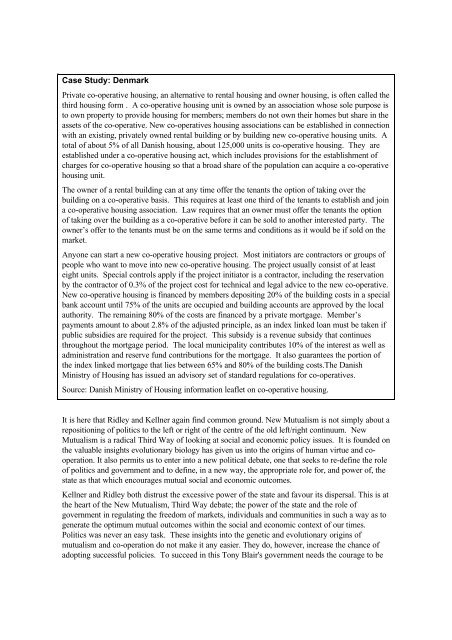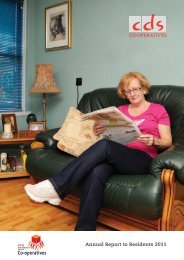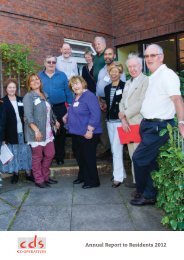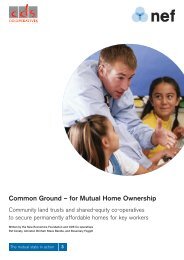New Mutualism - The Third Estate - CDS Co-operatives
New Mutualism - The Third Estate - CDS Co-operatives
New Mutualism - The Third Estate - CDS Co-operatives
- No tags were found...
You also want an ePaper? Increase the reach of your titles
YUMPU automatically turns print PDFs into web optimized ePapers that Google loves.
Case Study: Denmark<br />
Private co-operative housing, an alternative to rental housing and owner housing, is often called the<br />
third housing form . A co-operative housing unit is owned by an association whose sole purpose is<br />
to own property to provide housing for members; members do not own their homes but share in the<br />
assets of the co-operative. <strong>New</strong> co-<strong>operatives</strong> housing associations can be established in connection<br />
with an existing, privately owned rental building or by building new co-operative housing units. A<br />
total of about 5% of all Danish housing, about 125,000 units is co-operative housing. <strong>The</strong>y are<br />
established under a co-operative housing act, which includes provisions for the establishment of<br />
charges for co-operative housing so that a broad share of the population can acquire a co-operative<br />
housing unit.<br />
<strong>The</strong> owner of a rental building can at any time offer the tenants the option of taking over the<br />
building on a co-operative basis. This requires at least one third of the tenants to establish and join<br />
a co-operative housing association. Law requires that an owner must offer the tenants the option<br />
of taking over the building as a co-operative before it can be sold to another interested party. <strong>The</strong><br />
owner’s offer to the tenants must be on the same terms and conditions as it would be if sold on the<br />
market.<br />
Anyone can start a new co-operative housing project. Most initiators are contractors or groups of<br />
people who want to move into new co-operative housing. <strong>The</strong> project usually consist of at least<br />
eight units. Special controls apply if the project initiator is a contractor, including the reservation<br />
by the contractor of 0.3% of the project cost for technical and legal advice to the new co-operative.<br />
<strong>New</strong> co-operative housing is financed by members depositing 20% of the building costs in a special<br />
bank account until 75% of the units are occupied and building accounts are approved by the local<br />
authority. <strong>The</strong> remaining 80% of the costs are financed by a private mortgage. Member’s<br />
payments amount to about 2.8% of the adjusted principle, as an index linked loan must be taken if<br />
public subsidies are required for the project. This subsidy is a revenue subsidy that continues<br />
throughout the mortgage period. <strong>The</strong> local municipality contributes 10% of the interest as well as<br />
administration and reserve fund contributions for the mortgage. It also guarantees the portion of<br />
the index linked mortgage that lies between 65% and 80% of the building costs.<strong>The</strong> Danish<br />
Ministry of Housing has issued an advisory set of standard regulations for co-<strong>operatives</strong>.<br />
Source: Danish Ministry of Housing information leaflet on co-operative housing.<br />
It is here that Ridley and Kellner again find common ground. <strong>New</strong> <strong>Mutualism</strong> is not simply about a<br />
repositioning of politics to the left or right of the centre of the old left/right continuum. <strong>New</strong><br />
<strong>Mutualism</strong> is a radical <strong>Third</strong> Way of looking at social and economic policy issues. It is founded on<br />
the valuable insights evolutionary biology has given us into the origins of human virtue and cooperation.<br />
It also permits us to enter into a new political debate, one that seeks to re-define the role<br />
of politics and government and to define, in a new way, the appropriate role for, and power of, the<br />
state as that which encourages mutual social and economic outcomes.<br />
Kellner and Ridley both distrust the excessive power of the state and favour its dispersal. This is at<br />
the heart of the <strong>New</strong> <strong>Mutualism</strong>, <strong>Third</strong> Way debate; the power of the state and the role of<br />
government in regulating the freedom of markets, individuals and communities in such a way as to<br />
generate the optimum mutual outcomes within the social and economic context of our times.<br />
Politics was never an easy task. <strong>The</strong>se insights into the genetic and evolutionary origins of<br />
mutualism and co-operation do not make it any easier. <strong>The</strong>y do, however, increase the chance of<br />
adopting successful policies. To succeed in this Tony Blair's government needs the courage to be







